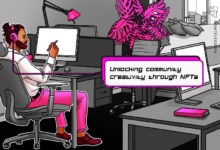I Made an NFT Collection to Represent My Student Loan Debt

Talk of mass student loan forgiveness will hopefully help students, but it can also shame them.
Many people regard it as yet another expense we can’t handle as a country while also refusing to acknowledge the societal expectation put upon young adults that they need to go to college to succeed. Additionally, loans for student borrowers are higher than almost any business loan and even most mortgage rates dating back to the 1980s.
Alex Hluch is a producer, writer and comedian residing in Los Angeles. This article is part of CoinDesk’s «Education Week.»
This nexus of forces, combined with the fact that financial literacy is not taught in the public education system, causes shame and regret among student borrowers. I wanted to create something to comment on this unique experience, as I have a significant amount of debt across multiple institutions.
See also: Best Universities for Blockchain 2022
“College Admission” is a performance art piece. I traveled to each of the nine institutions I attended as a student and took a photo on campus with either my diploma or my transcript. The price of each photo is equivalent to the amount of debt I have from each university, and the non-fungible tokens (NFT) representing the schools where I don’t have any debt are up for auction starting at 1 USDC each.
This collection seeks to showcase the vast economic disparity between public and private academic institutions as well as the chasm between graduate and undergraduate education.
My goal with this project is to devillify those with student loan debt, the pursuit of higher education and financial regret. I want to take a truly critical lens to an American institution that has become culturally de rigueur.
I chose NFTs as a medium because I believe in blockchain as the future of education. And if I’m truly being honest, I find it hilarious that someone can obtain roughly as much as I obtained for some of these degrees. (In my case, a piece of paper. In the buyer’s case, a well-thought-out photo of that piece of paper.)
I ruminated on this project for months before starting and I quickly realized that not only is the stigma behind having student loan debt building on a principal shame of not having enough money to support one’s self during college, but there’s also added shame in disclosing just how much you’ve spent, and on what degree. Culturally, $100,000 on a JD is far different than $100,000 on an MFA.
I know. I have two MFAs.
See also: NFT Artist Brian Frye Wants You to Steal This Article
Over the course of my far-too-extended academic career, I attended nine institutions: community colleges, public universities, graduate programs, an early-enrollment program and one private university. I attended this many institutions because I truly loved education and academia, and I craved the security that comes with “having a graduate education.” My experience showed me every different realm of higher education and gave me insight into their variables.

To be clear, I’m a staunch advocate of civilizations advancing knowledge and critical thinking, but we need to look at the predatory lending practices around federal (and especially private) student loans. (Do we honestly think giving kids a loan at 6% interest when they’ve just turned 18 is a sound economic idea?) We need to redirect the focus from how taxpayers are shouldering the burden to how the federal government publicly exploits young people who want to better themselves, all while saving money on state-subsidized public education.
With this NFT collection I hope to make others feel less guilty for seeking to obtain something they were told to want. I hope to make others reassess that the villain isn’t the pursuit of higher education, but the political benefactors and banks that have made wild profits off of this endeavor.
See also: Autodidacts Welcome!
I adore the pursuit of higher ed and think that educating a populace is the function of any civilization. I also think we live in a country where politicians seek to villainize young people trying to better their station in order to win over voters. We need to start calling out the hypocrisy in higher education funding while destigmatizing how much a handful of generations have already sunk into what may turn out to be more of a shell game than a viable return on investment.






 Bitcoin
Bitcoin  Ethereum
Ethereum  Tether
Tether  USDC
USDC  TRON
TRON  Dogecoin
Dogecoin  Cardano
Cardano  Bitcoin Cash
Bitcoin Cash  Monero
Monero  Chainlink
Chainlink  LEO Token
LEO Token  Stellar
Stellar  Zcash
Zcash  Litecoin
Litecoin  Hedera
Hedera  Dai
Dai  Cronos
Cronos  OKB
OKB  Tether Gold
Tether Gold  Ethereum Classic
Ethereum Classic  KuCoin
KuCoin  Cosmos Hub
Cosmos Hub  Gate
Gate  Algorand
Algorand  VeChain
VeChain  Dash
Dash  Tezos
Tezos  Stacks
Stacks  TrueUSD
TrueUSD  IOTA
IOTA  Decred
Decred  Theta Network
Theta Network  Basic Attention
Basic Attention  NEO
NEO  Synthetix
Synthetix  Qtum
Qtum  0x Protocol
0x Protocol  Ravencoin
Ravencoin  Zilliqa
Zilliqa  DigiByte
DigiByte  Nano
Nano  Siacoin
Siacoin  Numeraire
Numeraire  Waves
Waves  Enjin Coin
Enjin Coin  Ontology
Ontology  Status
Status  Hive
Hive  BUSD
BUSD  Lisk
Lisk  Pax Dollar
Pax Dollar  Steem
Steem  Huobi
Huobi  OMG Network
OMG Network  Bitcoin Gold
Bitcoin Gold  NEM
NEM  Augur
Augur